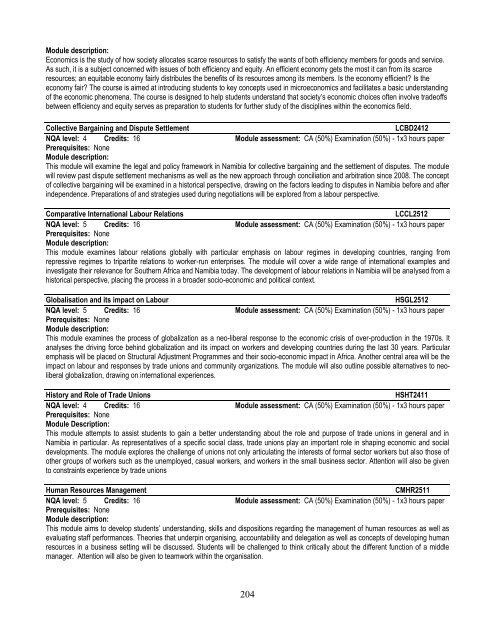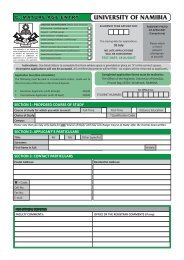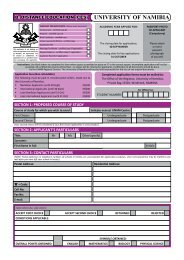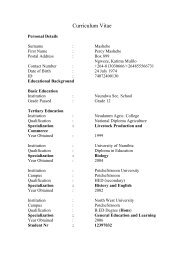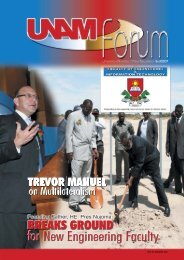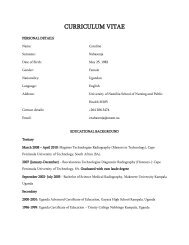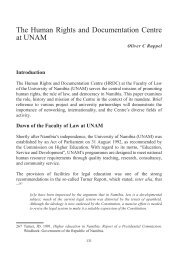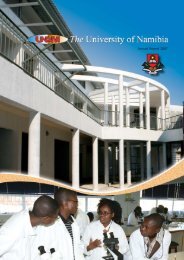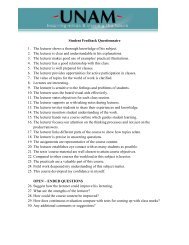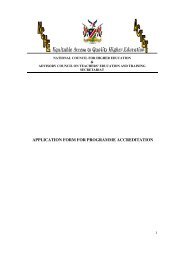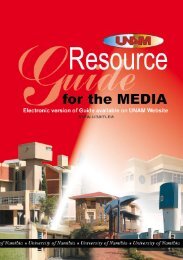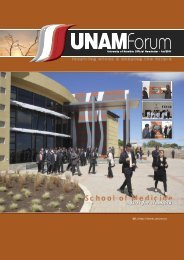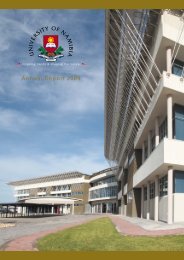UNIVERSITY OF NAMIBIA CENTRE FOR EXTERNAL STUDIES ...
UNIVERSITY OF NAMIBIA CENTRE FOR EXTERNAL STUDIES ...
UNIVERSITY OF NAMIBIA CENTRE FOR EXTERNAL STUDIES ...
You also want an ePaper? Increase the reach of your titles
YUMPU automatically turns print PDFs into web optimized ePapers that Google loves.
Module description:Economics is the study of how society allocates scarce resources to satisfy the wants of both efficiency members for goods and service.As such, it is a subject concerned with issues of both efficiency and equity. An efficient economy gets the most it can from its scarceresources; an equitable economy fairly distributes the benefits of its resources among its members. Is the economy efficient? Is theeconomy fair? The course is aimed at introducing students to key concepts used in microeconomics and facilitates a basic understandingof the economic phenomena. The course is designed to help students understand that society’s economic choices often involve tradeoffsbetween efficiency and equity serves as preparation to students for further study of the disciplines within the economics field.Collective Bargaining and Dispute SettlementLCBD2412NQA level: 4 Credits: 16 Module assessment: CA (50%) Examination (50%) - 1x3 hours paperPrerequisites: NoneModule description:This module will examine the legal and policy framework in Namibia for collective bargaining and the settlement of disputes. The modulewill review past dispute settlement mechanisms as well as the new approach through conciliation and arbitration since 2008. The conceptof collective bargaining will be examined in a historical perspective, drawing on the factors leading to disputes in Namibia before and afterindependence. Preparations of and strategies used during negotiations will be explored from a labour perspective.Comparative International Labour RelationsLCCL2512NQA level: 5 Credits: 16 Module assessment: CA (50%) Examination (50%) - 1x3 hours paperPrerequisites: NoneModule description:This module examines labour relations globally with particular emphasis on labour regimes in developing countries, ranging fromrepressive regimes to tripartite relations to worker-run enterprises. The module will cover a wide range of international examples andinvestigate their relevance for Southern Africa and Namibia today. The development of labour relations in Namibia will be analysed from ahistorical perspective, placing the process in a broader socio-economic and political context.Globalisation and its impact on LabourHSGL2512NQA level: 5 Credits: 16 Module assessment: CA (50%) Examination (50%) - 1x3 hours paperPrerequisites: NoneModule description:This module examines the process of globalization as a neo-liberal response to the economic crisis of over-production in the 1970s. Itanalyses the driving force behind globalization and its impact on workers and developing countries during the last 30 years. Particularemphasis will be placed on Structural Adjustment Programmes and their socio-economic impact in Africa. Another central area will be theimpact on labour and responses by trade unions and community organizations. The module will also outline possible alternatives to neoliberalglobalization, drawing on international experiences.History and Role of Trade UnionsHSHT2411NQA level: 4 Credits: 16 Module assessment: CA (50%) Examination (50%) - 1x3 hours paperPrerequisites: NoneModule Description:This module attempts to assist students to gain a better understanding about the role and purpose of trade unions in general and inNamibia in particular. As representatives of a specific social class, trade unions play an important role in shaping economic and socialdevelopments. The module explores the challenge of unions not only articulating the interests of formal sector workers but also those ofother groups of workers such as the unemployed, casual workers, and workers in the small business sector. Attention will also be givento constraints experience by trade unionsHuman Resources ManagementCMHR2511NQA level: 5 Credits: 16 Module assessment: CA (50%) Examination (50%) - 1x3 hours paperPrerequisites: NoneModule description:This module aims to develop students’ understanding, skills and dispositions regarding the management of human resources as well asevaluating staff performances. Theories that underpin organising, accountability and delegation as well as concepts of developing humanresources in a business setting will be discussed. Students will be challenged to think critically about the different function of a middlemanager. Attention will also be given to teamwork within the organisation.204


